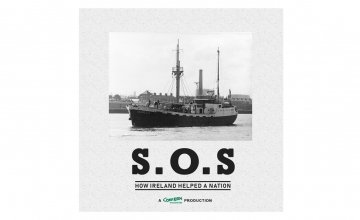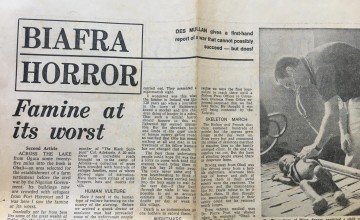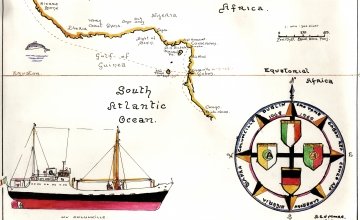
Read our 2023 annual report

Knowledge Hub
S.O.S: how Ireland helped a nation – a new podcast series from Concern

Our new podcast series tells the story of the bond between Ireland and Biafra. It’s a tale of ordinary people doing extraordinary things to help those starving behind a military blockade – from secret flights, to dodging bombs, to overcoming press censorship. It’s the story of how the people of Ireland were moved to help save the lives of people they'd never met, in a country thousands of miles away.
Welcome to Concern's first ever podcast series. You can listen and download from our dedicated podcast page, in iTunes, Spotify, and Stitcher or here via Soundcloud.
In 1967, the eastern region of Nigeria declared itself to be an independent state, known as Biafra. The war that followed this declaration led to mass starvation within the region of Biafra. In 1968 a young couple, John and Kay O’Loughlin Kennedy, were moved to do something to help the people who were starving. Their fundraising efforts went on to become the foundation of Africa Concern, later to become known as Concern Worldwide.
Biafra in crisis
In 1967, the eastern region of Nigeria declared itself to be an independent state, known as Biafra. The war that followed this declaration led to mass starvation within the region of Biafra. In 1968 a young couple, John and Kay O’Loughlin Kennedy, were moved to do something to help the people who were starving. Their fundraising efforts went on to become the foundation of Africa Concern, later to become known as Concern Worldwide.
Stories of bravery and compassion
In my time working for Concern, I developed a limited knowledge of Concern’s beginnings fifty years ago, but I had no sense of the enormity of what had happened. No real knowledge of the blockade that was put up around Biafra as it tried to break away from Nigeria, the extent of suffering it caused, or just how difficult and dangerous it was to deliver aid. No idea of how challenging it was to get news out from behind the blockade of what was really happening, or the key role that was played by John’s brother, Fr. Raymond Kennedy, in breaking the story of starvation to the world. I had no idea of the complexities and the dangers involved for the people who were receiving and distributing aid inside Biafra. And most of all, I had no grasp of the huge outpouring of empathy and generosity from Irish people when they saw what was happening in Biafra. As images of people starving to death were broadcast on television and printed in newspapers, this was the first time since Ireland’s own famine that Irish people saw what starvation really looked like and their response to this was nothing short of phenomenal.

Concern co-founder John O’Loughlin Kennedy paid a visit to Concern HQ in Dublin earlier this year to tell staff about Biafra and the response he helped to spearhead. His stories gave a sense of the adventurous spirit, the bravery and determination that drove what was an incredible aid effort at the time. There were stories of daring flights, dodging bombs and aid operations under the cover of darkness; overcoming press censorship; breaking down religious barriers; and big, bold decisions like buying a ship. They also illustrated of the depth of compassion that existed in Ireland for people suffering through a crisis in a place most had never heard of before.
Podcast series
This podcast series documents many of John’s stories, and the stories of eight other people. Collectively, they paint a picture of a young nation in crisis and the collective efforts of the Irish people to support them.
Among the other contributors are Karl Vekins, who joined the crew of Concern’s ship, the M.V Columcille, and set sail for the west coast of Africa at the age of just 16. Des Mullan, who was a reporter for the Irish Independent and the Evening Herald at the time and twice visited Biafra to report on events there. Dermot Doran, a Holy Ghost priest who flew in some of the first aid supplies to reach Biafra on a daring and clandestine flight and continued to operate that route throughout the early months of the aid response. And Philips Uzoma, who was just six years old when the conflict reached his village in Biafra, forcing his family to flee their home and leaving them entirely reliant on food aid for their survival.

A remarkable bond
As I listened to their stories, it struck me that the themes that emerged are as relevant today as they were fifty years ago. Starvation is still used as a weapon of war. Conflict still creates food crises and brought two of Concern’s programme countries to the brink of famine in 2017. People around the world still put their lives at risk to deliver aid to people in crisis. And the people of Ireland are still overwhelmingly generous in response to suffering around the globe.
But the context in which this story unfolded is very different to today’s world.
There were no mobile phones and no internet in 1968. There were no established humanitarian networks within which to operate. Ireland on the whole was a much poorer country compared to today. Helping people in humanitarian crises is always a difficult and challenging task, but the obstacles that were overcome to help the people of Biafra in the late 1960s would have seemed insurmountable to many.
What happened in Biafra was devastating. How Ireland reacted was truly inspiring. This series tells the story of the remarkable bond that developed between the two nations and a fascinating moment in Irish history.
This series is a Concern Worldwide production. It was researched and presented by Clare Ahern and produced by Colette Kinsella for Red Hare Media


